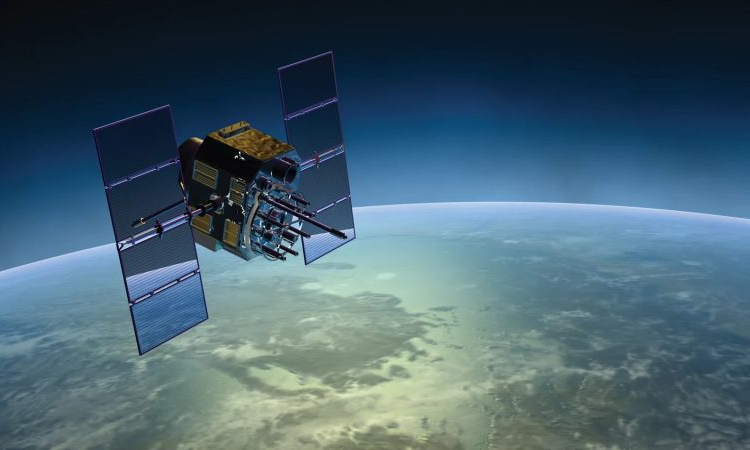Nigeria is poised to take a major step in its security and defense capabilities with the launch of additional military satellites. This development will help to enhance the country’s security posture, allowing for greater surveillance and monitoring of potential threats. The satellites will be able to provide Nigeria with detailed images of its land, seas, and airspace, which will aid in the detection of potential security risks. Additionally, the satellites will be able to detect and track the movement of military vessels, aircraft, and other vehicles, allowing for better coordination between military forces.
The Chief of Defence Space Administration, Air Vice Marshall Ayo Jolasinmi, says Nigeria will soon launch Satellites II and III into space, during a visit to the Minister of Defence, Major General Bashir Magashi (retd.), in Abuja, Jolasinmi stated that the orbit was working perfectly and that his service would need the support of the ministry to service its frequency.
A statement by the Special Assistant to the Minister on Media and Publicity, Mohammad Abdulkadri on Friday read, “The Chief of the Defence Space Administration thanked the minister for approving his appointment and ensuring the timely release of intervention funds which he said was cushioning the effects of the minimal budgetary allocation.
“Jolasinmi said the DSA was better positioned to use Space products with the launch of the first satellite while satellites two and three will be launched soon.
The launch of these satellites will also help to improve communications and coordination between military forces. By providing a secure, reliable link between locations, military personnel will be able to receive and share important information in a timely manner. This will improve the effectiveness of their operations and allow for better decision-making in the face of potential threats. Additionally, the satellites will provide a platform for improved communication between ground forces and the Nigerian government, allowing for better coordination of security-related operations.
Furthermore, the satellites will assist in the identification of potential threats by providing real-time information to Nigerian security forces. The satellites will be able to detect suspicious activities and alert the appropriate personnel, allowing for a swift response to potential threats. Additionally, the satellites will be able to provide images of suspected terrorist camps or hideouts, allowing for more effective counter-terrorism operations.
The launch of these satellites will also help to enhance the Nigerian government’s ability to monitor and respond to natural disasters. The satellites will be able to detect and monitor changes in the environment, alerting the appropriate authorities of any potential threats. This will allow for better preparedness and response to natural disasters, ensuring the safety and security of Nigerian citizens.
Finally, the launch of additional military satellites will help to improve Nigeria’s overall security. By providing real-time monitoring and intelligence, the satellites will enable the Nigerian government to respond swiftly to potential threats, while simultaneously enhancing the country’s ability to protect its citizens. With these satellites in place, Nigeria will be able to stand firm against the threat of terrorism and other forms of violence, ensuring the safety and security of its citizens.
This January, the Federal Government of Nigeria inaugurated an integrated satellite called DELSAT-1 to enhance the operational capacity of the Nigerian armed forces against insecurity.
This will assist in realising the nation’s sectoral strategies that respond to identified threats to Nigeria’s national interests, such as the National Defense Policy, National Counter Terrorism Strategy and the National Policy on Public Safety and Security.
China’s 18-story Long March 3B rocket likely launched DELSAT-1 into space from the Xichang launch base in Sichuan province in southwestern China.
Nigeria’s space ambitions began as early as 2002 when the Assistant General Director of Training and Capacity Building at NASRDA made a presentation paper setting out a 28-year roadmap for the research, developing and launching of satellites from Nigeria by 2030.
A few months after the Nigerian Vice-president Professor Yemi Osinbajo signed the Defense Space Administration Bill into law on February 18, 2017, previously passed by the National Assembly, the Nigerian Military commissioned the Defence Space Administration Office Complex and the Foundation Laying of Defence Cyber Operations Centre, at Obasanjo Space Centre, Abuja.
In 2018, the Nigerian Space Research and Development Agency (NASDRA) – the agency in charge of coordinating all Nigerian space activities claims that its constellation of satellites could be the hub for out-of-space monitoring and tracking of aviation globally. The agency believes that it has the capability to locate any airborne plane within and outside Nigeria.
Recent development includes Nigeria and India signing a Memorandum of Understanding (MoU) to cooperate in the exploration of outer space for peaceful purposes.
Both countries agreed to sign a supplemental MoU on partnership in use of geospatial technology between the New Space India Limited (NSIL) under ISRO and the Nigeria Erosion and Watershed Development and Connectivity.


